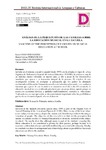Mostrar el registro sencillo del ítem
Análisis de la percepción de las familias sobre la educación musical en la escuela
| dc.contributor.author | Chao-Fernández, Rocío | |
| dc.contributor.author | Pérez Crego, María Cristina | |
| dc.contributor.author | Chao-Fernández, Aurelio | |
| dc.date.accessioned | 2020-05-04T08:27:47Z | |
| dc.date.available | 2020-05-04T08:27:47Z | |
| dc.date.issued | 2020 | |
| dc.identifier.citation | Chao-Fernandez, R., Pérez Crego, M., & Chao-Fernández, A. (2020). Análisis de la percepción de las familias sobre la educación musical en la escuela. DIGILEC: Revista Internacional De Lenguas Y Culturas / International Journal of Languages and Cultures, 6, 75-88. https://doi.org/10.17979/digilec.2019.6.0.5954 | es_ES |
| dc.identifier.issn | 2386-6691 | |
| dc.identifier.uri | http://hdl.handle.net/2183/25487 | |
| dc.description.abstract | [Resumen] Incluida en el sistema educativo español desde 1990 con la entrada en vigor de la Ley Orgánica de Ordenación General del sistema Educativo (LOGSE), la música es una de las materias menos valoradas en nuestro país, y ello a pesar de los innumerables beneficios que aporta a la formación integral de la persona. El objetivo de esta investigación consiste en averiguar la percepción que los padres de alumnado escolarizado en Educación Primaria tienen sobre su inclusión en la escuela. Los resultados muestran que a pesar de que la música se encuentra en el día a día del alumnado, la educación musical no es considerada prioritaria por sus progenitores, quizás porque se asocia con cuestiones técnicas y aptitudes tradicionalmente asociadas al virtuosismo. Finalmente se concluye que existe un desconocimiento importante sobre las posibilidades que la educación musical puede ofrecer al discente. | es_ES |
| dc.description.abstract | [Abstract] Included in the Spanish education system since 1990 as part of the Organic Law of General Planning of the Educational System (LOGSE), Music is one of the least valued school subjects in our country, despite the innumerable benefits it provides to the integral formation of people. The objective of this research is to find out the perception that parents of students enrolled in Primary Education have about the inclusion of this subject in school. The results show that although music is part of the students' everyday life, Music education is not considered a priority by their parents, perhaps because it is associated with technical issues and skills traditionally associated with virtuosity. Finally, we conclude that there is an important lack of knowledge about the possibilities that music education can offer to the students. | es_ES |
| dc.language.iso | spa | es_ES |
| dc.publisher | Universidade da Coruña | es_ES |
| dc.relation.uri | https://doi.org/10.17979/digilec.2019.6.0.5954 | es_ES |
| dc.rights | Atribución-CompartirIgual 4.0 España | es_ES |
| dc.rights.uri | http://creativecommons.org/licenses/by-sa/3.0/es/ | * |
| dc.subject | Educación primaria | es_ES |
| dc.subject | Música | es_ES |
| dc.subject | Familia | es_ES |
| dc.subject | Primary education | es_ES |
| dc.subject | Music | es_ES |
| dc.subject | Family | es_ES |
| dc.title | Análisis de la percepción de las familias sobre la educación musical en la escuela | es_ES |
| dc.title.alternative | Analysis of the Perception of Families on Musical Education at School | es_ES |
| dc.type | info:eu-repo/semantics/article | es_ES |
| dc.rights.access | info:eu-repo/semantics/openAccess | es_ES |
| UDC.journalTitle | DIGILEC: revista internacional de lenguas y culturas | es_ES |
| UDC.volume | 6 | es_ES |
| UDC.startPage | 75 | es_ES |
| UDC.endPage | 88 | es_ES |






